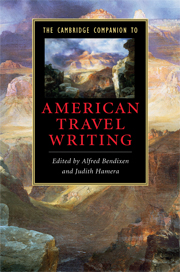Book contents
- Frontmatter
- Introduction: new worlds and old lands - the travel book and the construction of American identity
- Part I Confronting the American landscape
- Part II Americans abroad
- Part III Social scenes and American sites
- 11 African American travel literature
- 12 American women and travel writing
- 13 Driving that highway to consciousness: late twentieth-century American travel literature
- Chronology
- Further Reading
- Index
11 - African American travel literature
from Part III - Social scenes and American sites
Published online by Cambridge University Press: 28 March 2009
- Frontmatter
- Introduction: new worlds and old lands - the travel book and the construction of American identity
- Part I Confronting the American landscape
- Part II Americans abroad
- Part III Social scenes and American sites
- 11 African American travel literature
- 12 American women and travel writing
- 13 Driving that highway to consciousness: late twentieth-century American travel literature
- Chronology
- Further Reading
- Index
Summary
Defining the genre of African American travel writing is more complex than it may seem. Europeans became colonizers, enslavers, and oppressors of mainland African peoples. Contact space on indigenous lands between Africans and Europeans became conflict space, as were the sites of resistance in the New World where slaves were transported. Enslaved peoples' tales of captivity and dehumanization arose immediately in African and New World cultural discourses but, being orally based people without power to counter Europe's control over their bodies, their voices, and their stories, these African slaves resorted to mainland practices by passing on their stories from one generation to the next in oral form. Those displaced African captives who managed to learn the master's tongue, and to garner support from third parties, not only gave their stories to the world in published form, but also ushered in a particular form of writing known as the slave narrative. Moreover, this form, with its specific rhetorical devices, birthed specialized subject matter and a discourse emphasizing the embodied experience of dehumanizing captivity. The captives endured physical shocks to the body and psychological fractures to the mind from being kidnapped and transported away from their homelands across the Atlantic Ocean to New World destinations at which they became sentenced to lifelong servitude as chattel property. The slave narrative thus generated its own sub-genre of travel writing. Specifically, early African American travelers often embarked upon unauthorized liberatory initiatives for the purposes of emancipation, re-identification, regeneration, or self-reliance that frequently conflicted with the principles of Euro-American colonization, slavery, and imperialism.
- Type
- Chapter
- Information
- The Cambridge Companion to American Travel Writing , pp. 197 - 213Publisher: Cambridge University PressPrint publication year: 2009
- 3
- Cited by

